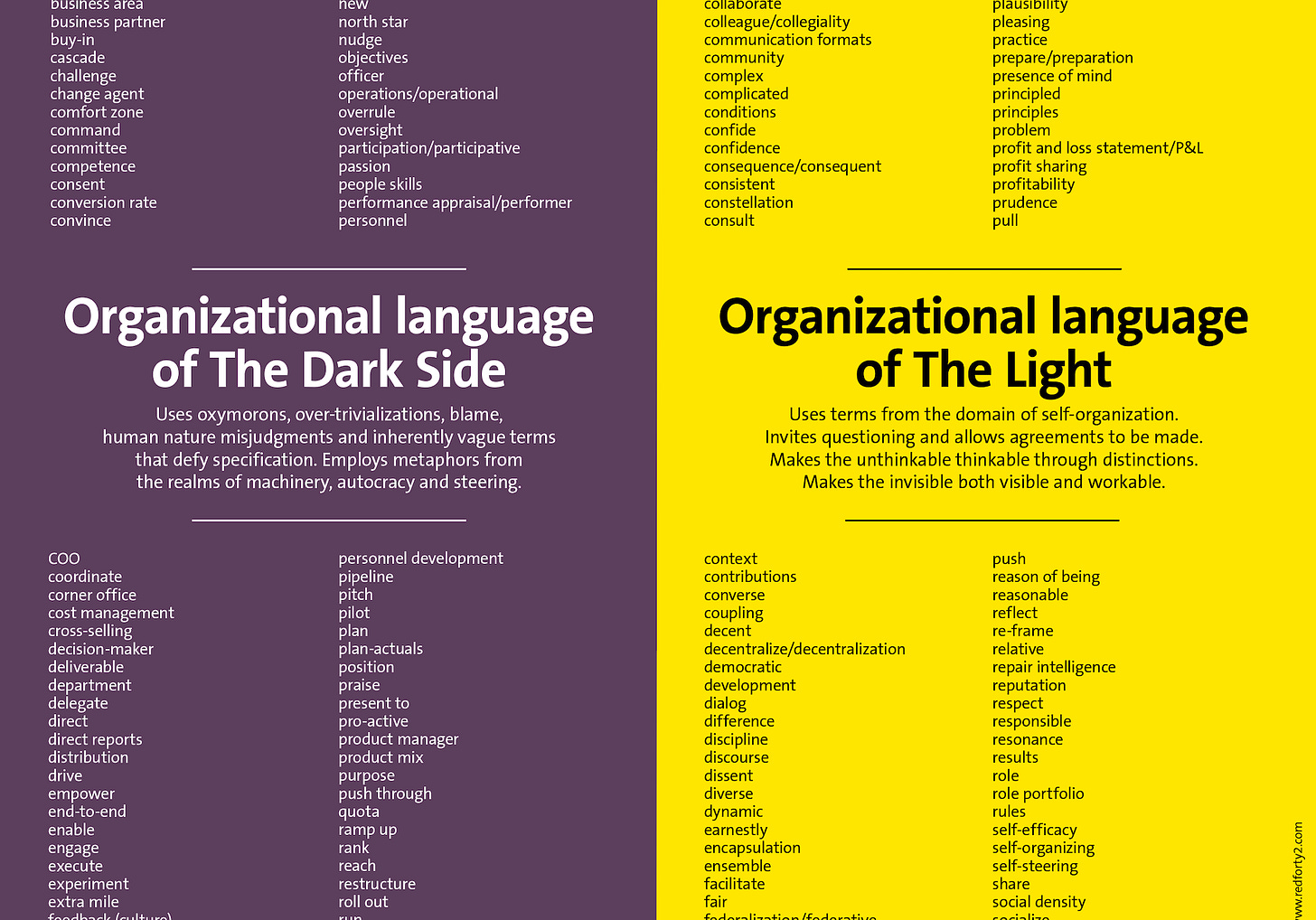Talking Beta: Language in organizations is ripe for an overhaul
At least if we want to make workplaces more fun, more democratic and more effective
Everybody knows that workplace lingo is highly exchangeable between organizations. It’s why the Dilbert cartoons work so well: The words are pretty much the same everywhere – as are most of the metaphors, mental models and behaviors. To make matters worse, work-related language in companies is often bloated, pompous, vulgar, impersonal, paternalistic and full of cliché. If that sounds harsh, then consider the words that have become fashionable in the last couple of years, which are hardly better than the previous ones, as they sometimes even nullify useful nuance and distinctions that used to exist. Take the ridiculous over-use of strategic, purpose, culture, values, mindset, mindfulness or (gasp!) comfort zone.
Problem is: The sloppier an organization’s language becomes, the harder it will find to produce or to sustain social density – which is a key ingredient to self-organization on the level of the individual, the team and the organization as a whole. Now, in case you wonder: Psychological Safety is great. But to the eye of the trained systems thinker, Psychological Safety is clearly more symptom than problem, more effect than cause. Psychological Safety is read-only.
Language, on the other hand, runs truly deep, as organizations consist of nothing more than communication, according to the great Niklas Luhmann, whom we should listen to in this matter. Luhmanns sophisticated insight implies that people, persons or individuals as such not part of organizational life – only their communicative patterns are. This explains why, for example, key personnel can change, while an organization stays the same. Or why organizations might change without people’s identities changing that much, and without lots of “new” people on board. People are just not part of organizations. And that explains a lot. Language maketh organizations, one might say. Systems theory royalty like Luhmann, Karl Weick or Ralph Stacey would agree.
Psychological Safety is read-only.
Organizational language is not.
Language maketh organizations.
Luhmann’s crucial insight explains why the quality of the language we employ at work makes all the difference. Which takes us to the matter of what expressions, metaphors and individual words convey, besides the seemingly obvious.
Level 1: Get the vocabulary straight
In our client work on profound transformation,
and I have found that organizational language must be carefully influenced and curated to remain edgy. Since when, you might ask, is edgy a category? Well, we have found that, with regards to organizational wording and vocabulary, edgy is the opposite of vulgar. Think about it: How will you construct shared meaning within groups large or small, if your words aren’t crisp, specific, pointy and raising questions? What happens if your words are ordinary - without inviting discourse and clarification at all times? Pleasing, bland language serves no one, if the point of your work is to bring about intentional change.There are two ways of making language sufficiently edgy.
The first is to drive out bland, paternalistic and vague words. You do that by correcting each other, by suggesting to be more specific, or by asking for clarification, or by poking at the word (not the person).
The second way of making language edgy is to start using better expressions and words, systematically, and to invite others to follow suit. Which will be awkward at first! But you won’t be the world’s first person do so.
All our clients at some point needed to put words to work that seemed awkward at first. They had to, simply to describe Beta ways of interacting (e.g. debate and agree, instead of align; preparing instead of planning)). Or take the words you need to describe decentralized organizational structures: periphery, center, cells, value creation accounting, who serves whom? While words like departments, business units, shared business centers, budgets, allocations and profit centers had to be buried or abandoned, for good. I frequently object when my clients try to bring in sloppy vocabulary. Some try to substitute center with “core”, or try to keep talking of “announcing” things, instead of sharing or conversing. Or take the example of Toyota. They adopted the word Takt from German language, because it beautifully conveyed the meaning they were looking for. W. L. Gore borrowed the term waterline. Systems theory imported vocabulary from fields of biology into sociology that we can put to great use in Beta organizing.
That is also why I prefer expressions such as social density, peer pressure, repair intelligence (very edgy) or resonance more than vague and rather ghastly-sounding terms like align, convince, strategic or motivating. Reason of being is better than the now ubiquitous purpose. Socializing or communitizing (very edgy) is better than communicating or announcing. Leaderships is better than leadership – and far better, of course than the ghastly leaders and leading. Mastery is preferable to skill or competence (which means absolutely nothing, really).
So if you want to bring proper self-organization, decentralization and Beta to organizations - your own organization or those of your clients – how will you achieve that with common, vulgar, exchangeable words and language? There is no way around deploying edgy, crisp and pointy language. If you long for suggestions about what kind of words to fight, and what kind of vocabulary to embrace, then the Power of Language poster that
and I created in English and in German over the last few years may prove helpful.Level 2: New words to build new worlds
The next level of bringing meaningful, useful, democratic language to organizations is to crafting new words. This may sound like odd advice. As my friend, mentor and fellow Beyond Budgeting Round Table director Robin Fraser taught me 20 years ago, “if we want to create truly profound change, we must dare to create new words.” I have taken this advice to heart, as some of you who have previously been in touch with my work may know. Silke Hermann and I have coined a range of new terms that we consider essential for Beta organizations and Beta transformation - from change-as-flipping and org physics to with-each-other-for-each-other and want-can-should-may-must (very edgy).
We did not invent how to invent Beta language crafting, of course. Here, again, Toyota may serve as a powerful example. Since the 1950s, the company has practiced word-creation galore. Take well-known lean terms like Heijunka, Kanban, Kaizen or Jidoka, which were built up from separate, short words of the Japanese language that once would have seemed odd to use in work and organizations.
Let’s work the wondrous ways in which the words woo us
I have come to believe that language is pretty much the essence of the organizational renaissance we are seeking. Just consider the break-down of the 12 BetaCodex principles into more detailed principles and distinctions in the Laws of the BetaCodex booklet, and the distinct language of organizational democracy and decentralization will become obvious to you. Organizational transformation is certainly inseparable of a transformation of language within those organizations, and the patterns of thinking behind the words. The invitation to you is this: Upgrade your language to Beta. It costs nothing, and nobody is standing in your way of doing so. If you change the way you talk, and others do the same, then maybe a large share of organizational problems will take care of itself.
Get the Power of Language poster by Red42
In English - Read an article about this poster. – In German
Disclosure: No A.I. was used in the process of writing this article, except for translation or research purposes.





I would like to add one more point: Unfortunately, in the times we live in, it is becoming increasingly acceptable to use derogatory and divisive language. This makes it all the more important for organizations to be aware of their own language and to use it carefully.
I really enjoyed reading your post. It brought clarity and awareness to something that has bothered me for a long time: how the sloppiness of language use leads to great chasms in people's shared understanding. It also reminds me of a time in my life, whilst taking part in an intensive personal development training where we came up with the word 'meaningfying' for the act of making meaning. Later I came across Karl Weick's sensemaking - but somehow it doesn't have quite the same sense of grappling with deeper meaning for me.